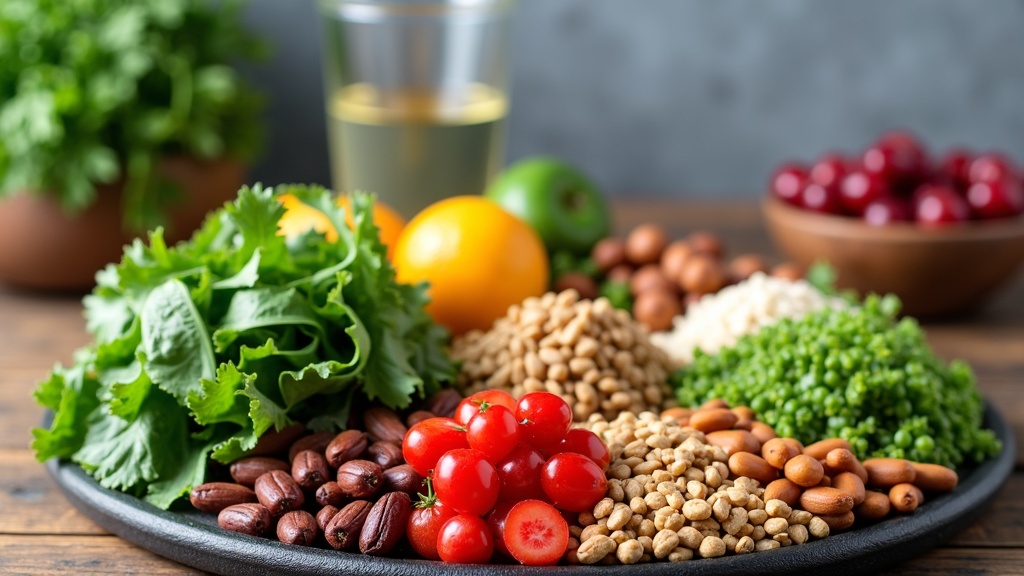Looking to boost your immune system naturally? Curious about how what you eat might play a part? Plantbased diets have caught plenty of attention for more than just their effect on the scale.
Lately, a lot of people are curious about how plantbased foods might help the body stay protected from everyday bugs and illnesses.
After checking out the research, I’m happy to walk you through how plantbased diets may support immune function and what you might want to add to your own meals if you want to give your immune system a little nudge.

How Plantbased Diets Connect With Immune Support
Eating a diet rich in plants is about more than salads and skipping animal products.
Plants bring a mix of nutrients, fiber, and natural compounds like antioxidants that play a role in keeping different body systems running smoothly. This includes the immune system.
When people talk about “plantbased,” they usually mean a way of eating that centers on veggies, fruits, grains, nuts, beans, and seeds. Some folks go 100% vegan, while others include small amounts of animal products.
The core idea is making plants the star on your plate.
Research published in journals like Nutrients highlights that plantbased eaters often have lower levels of inflammation, a condition linked to poor immune responses and chronic illness.
Fiber and phytonutrients are key here.
Fiber helps the gut (a really important part of your immune system) stay balanced, while phytonutrients, natural plant chemicals, act as natural defenders against cell damage.
Getting Started With a Plantbased Diet for Immunity
Switching up your plate does not have to be complicated.
Focusing on a few basics helps you make the most of those immune-supporting benefits, even if you’re just starting out.
- Load Up on Color: Each color in fruits and veggies usually means a different mix of vitamins and antioxidants. The wider the variety, the better the coverage for your immune system.
- Don’t Forget Protein: Beans, lentils, tofu, quinoa, and seeds offer plenty of plant protein, which your body needs for producing antibodies and maintaining immune cells.
- Choose Whole Foods: Go for food in its most natural form, such as brown rice instead of white, or a whole apple instead of applesauce with sugar. The less processed the food, the more nutrients per bite.
- Stay Hydrated: Water, herbal teas, and even waterrich fruits or veggies keep everything circulating properly and help your body flush out what it doesn’t need.
Getting fiber, healthy fats, and plantbased protein into every meal lays a strong foundation for your immune cells to do their job.
Simple Steps for Adding ImmuneBoosting Foods
No need to change every meal right away. These tips can help you sneak more immune-friendly plant foods into your daily routine:
- Add Garlic and Ginger: Toss fresh garlic and ginger into stirfries, soups, or roasted veggies. They have natural compounds that support immune health, as noted in the Journal of Immunology Research.
- Pair Vitamin C With Iron: Eating foods rich in vitamin C (like oranges, peppers, or strawberries) along with foods high in plant iron (like spinach or beans) helps your body absorb iron better and supports immune cell production.
- Snack on Seeds and Nuts: Sunflower seeds, pumpkin seeds, and almonds have vitamin E and zinc, two nutrients especially helpful for immune defense.
- Drink Green or Herbal Tea: Many teas have natural antioxidants called polyphenols, which can help manage inflammation and microbial threats.
- Try Fermented Plant Foods: Sauerkraut, kimchi, miso, and tempeh help boost the good bacteria in your gut, working together with your immune system.
Making small changes like these keeps your immune system supported all day long.
What to Know Before Switching to Plantbased
Trying out a plantbased way of eating can feel like a big switch, but a few tips make it easier if immune support is your goal:
- B12 and Vitamin D: These vitamins are harder to get from plants alone. Think about using supplements or fortified foods for B12, and make sure you spend time outside or choose fortified foods for vitamin D.
- Protein Variety: Mixing different plant protein sources helps you cover all the amino acids your immune cells need.
- Iron and Zinc: Beans, lentils, nuts, and seeds are good sources. Soaking or sprouting them before eating can help your body make use of these minerals better.
- Plan Meals Ahead: A rough meal plan keeps you from missing nutrients or grabbing processed foods in a pinch.
B12 and Vitamin D
B12 keeps nerve and blood cells healthy, and low levels can mess with your body’s defenses.
With a mostlyplant plate, it’s smart to consider a B12 supplement or choose foods like nutritional yeast or plant milks that have B12 added.
For vitamin D, get outside in the sun or go for fortified foods like cereals and nondairy milks, since vitamin D is well associated with immune strength.
Mixing Up Protein Sources
Animal foods have all “essential” amino acids, but you can get the full range by eating a mix of plants through the week.
Pair beans with grains or enjoy different seeds and nuts so your immune system always has what it needs.
Iron and Zinc
Iron helps make hemoglobin, which carries oxygen for energy and supports immune cell growth.
Zinc is crucial for a good immune response. Beans, chickpeas, lentils, oats, and pumpkin seeds are all excellent for these nutrients if you make them a kitchen staple.
Extra Habits For Immune Health
Sometimes, it’s not just about what you eat, but how you eat and what else is going on in your life.
Here are some bonus tips that can make your plantbased approach even stronger for your immune system:
Prioritize Sleep: Sleep is vital for your body to repair and recharge immune cells.
Seven to nine hours per night helps much more than any single food can.
Stay Consistent: Immune support comes from what you do most days, not just a “detox” week.
Stick with plant-rich meals regularly.
Combine With Other Healthy Habits: Moving your body, managing stress, keeping up with vaccines, and following medical advice all play a role in overall immune support.
Foods to Keep On Your Immune “A List”
Some foods shine when it comes to immune system perks. Here’s a handy list to keep in mind during shopping:
- Citrus Fruits: Oranges, grapefruit, lemons, and limes are classic picks for vitamin C to help reduce how long cold symptoms last.
- Berries: Strawberries, blueberries, raspberries, and blackberries bring plenty of antioxidants and fiber.
- Leafy Greens: Spinach, kale, collard greens, and Swiss chard add vitamins A, C, and E, plus folate and minerals.
- Cruciferous Veggies: Broccoli, cabbage, and Brussels sprouts come packed with phytochemicals like sulforaphane, tying in with strong immune cell activity.
- Legumes and Pulses: Beans, lentils, and chickpeas deliver protein and minerals bundled together.
- Seeds and Nuts: Especially pumpkin seeds and almonds for a dose of zinc and vitamin E.
- Garlic, Onions, and Leeks: These allium vegetables have compounds that help your body fend off bacteria and viruses.
Keeping a few of these at home makes it simple to put together meals that taste great and support your immune system.
PlantBased Eating and Immune Health: Frequently Asked Questions
Many folks want to know more about plantbased eating and the immune system. Here are common questions I’m asked:
Question: Will going plantbased make me get sick less often?
Answer:
There’s no food that can guarantee you’ll never get sick, but people who build their meals around plants often notice fewer infections and faster recovery times.
This depends on having a balanced diet, sleeping well, managing stress, and more.
Question: Can kids and older adults follow a plantbased immuneboosting diet safely?
Answer:
Yes, with good planning.
Both kids and older adults should get a variety of plant proteins and reliable sources of B12 and vitamin D.
Regular checkins with a medical pro or registered dietitian can be a big help.
Question: Are there plant foods I should avoid for my immune system?
Answer:
Highly processed foods, even if they are plantbased (such as chips or sweets made from refined flours and sugars), don’t offer the same nutrition as whole foods.
It’s best to stick to whole, colorful foods most of the time.
Why It’s Worth Trying
Filling your plate with plantbased meals gives your body balanced nutrition, plenty of fiber, and a steady stream of vitamins and minerals for a healthy immune system.
You don’t need to be perfect to feel a difference; just putting plant foods at the center of your meals can mean better energy, more resilience during cold season, and a sense of confidence that your daily choices are giving your body the right support.
If you’d like to learn more, check out details from the Academy of Nutrition and Dietetics or ask your healthcare provider for tips tailored to your own routine.
Even small steps to add more plants every day can make your new habits last for the long run.
